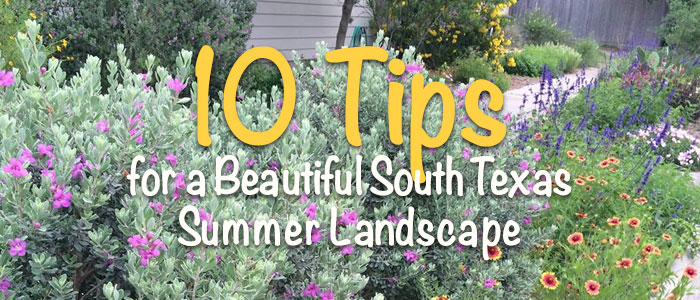1. Proper Watering
This is the most important of all. Water slow and deep to make sure at least one inch of water is applied to all established lawn and landscape plants for our long hot summers. Smaller bedding plants such as annual color and perennial beds will require a second supplemental watering since they have a smaller root system.
2. Mulching
Use hardwood mulch three to four inches deep in planting beds to help conserve moisture as well as control weeds. Most mulch is applied too thin, only two inches rather than three to four. Do not bury crown of plant or trunk of shrubs.
3. Top Dress The Lawn
A thin layer of Nature’s Blend Compost applied several times a year helps to enrich the soil and will cut watering demands.
4. Insect Controls
Many insects are seasonal. Chinch bugs attack lawns in the hot summer months, so watch the edges of your lawn for the first signs. Spider mites also love the hot dry summer season. Keep an eye on junipers, pittosporums and houseplants for signs of mottling on the leaves or leaf drop and treat as soon as possible. Mealy bugs are also a hot weather insect and leave white cotton along the stems and undersides of many plants. More than one application may be needed to control some of these insects.
5. Fungus Control
This is not always an issue in the summer, but can be if we are getting periods of heavy rain. Proper year round watering and adding Nature’s Blend several times a year will help minimize fungal issues.
6. Fertilizing
Keeping your plants fed for the summer is very important, but applying at a lower rate may help to keep them healthy without encouraging too much new growth. Using organic fertilizers keep the plants healthy which minimizes insect attacks, Milorganite Fertilizer for instance.
7. Pruning
Some plants will need to be pruned in the summer to keep them more compact and not overgrown. Be careful, though, since some plants can sunburn easily when removing the upper leaves which have been shading the rest of the plant.
8. Weed Control
Some weeds burn off in the summer heat. Pre-emergents, such as Green Light Amaze and Hi Yield Weed & Grass Stopper can be applied year round in landscape beds to prevent weeds. Organic weed killers, such as Nature’s Guide Horticultural Vinegar, for landscape beds, are most effective in hot summer temperatures. But broadleaf lawn weed killers cannot be used in your grass once temperatures get above 85 degrees due to burning. Keep the grass mowed to remove seed heads of weeds. Mechanical means is always the best.
9. Proper Mowing Height
Proper mowing height will shade the ground and cause less water evaporation from the soil, reducing water needs. St. Augustine is best at three inches, so raise the mower. Also a sharp mower blade helps the grass look fresh and green, while a dull blade leaves ragged edges that turn brown and cause the lawn to look somewhat dead and dull.
10. Proper Plant – Proper Place
With any landscape make sure you have thought out the full mature height and width of plants, sun requirements and water needs before planting. You should never be constantly pruning a plant because it is too large for the space. That is the wrong plant for the spot. Also group like water need plants together. The most drought tolerant plants should be those furthest from the water source.
Now that you have worked hard at planting and maintaining the landscape, take the time to kick back, relax and admire the beauty you created. Gardening is great therapy! it not only burns calories, it also reduces stress from a hard day’s work and helps to lower blood pressure. Colleges are even offering courses in horticultural therapy. Gardeners live longer lives; plants give you reason to get up and get moving!
 -DeAnna
-DeAnna



Reader Interactions